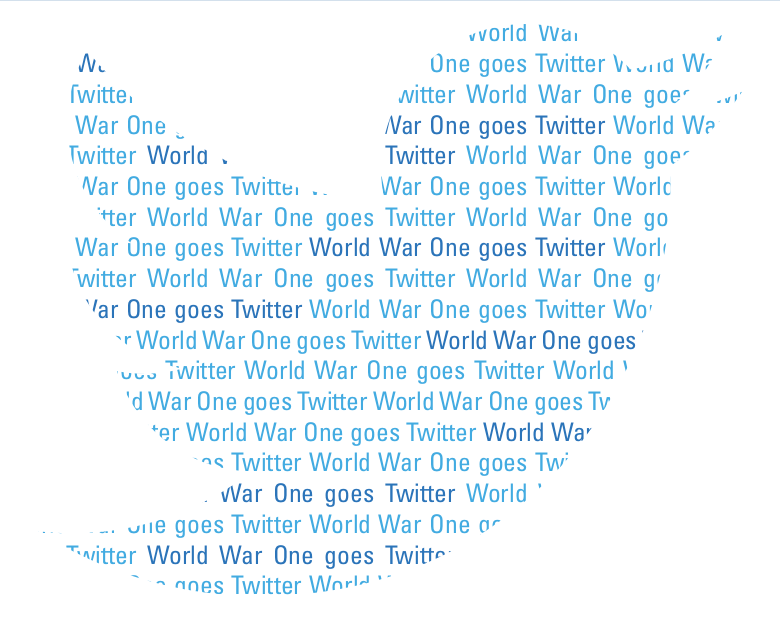 On the occasion of the First World War commemorations, Masters of Modern European History students at the University of Luxembourg are using Twitter to recount, day after day, the twists and turns of the conflict via the @RealTimeWW1 account.
On the occasion of the First World War commemorations, Masters of Modern European History students at the University of Luxembourg are using Twitter to recount, day after day, the twists and turns of the conflict via the @RealTimeWW1 account.
A conflict in 140 characters; an entire peace treaty in two lines; history written in tweets… and at university, what’s more…This is the wild gamble attempted by the teaching staff on the Masters in Modern European History at the University of Luxembourg, to commemorate the centenary of the First World War. Each tweet is published one hundred years day for day — or even hour for hour — after the event it recounts. Almost 200 tweets have already been published and more than 1,500 others are in the pipeline, repainting the sweeping canvas of a destructive conflict that cost 9 million lives and left 8 million with terrible injuries!
Consequently, on 24th January 2014, a tweet announced the warning from the French War Ministry of the risk of a conflict that could threaten stocks of food for the inhabitants or Paris. The next day, another tweet announced that the Paris city council had decided to purchase 400,000 euros worth of flour stocks. For Benoît Majerus, a researcher and lecturer in history, as well as the director of Masters studies, behind this initiative, the Twitter account @RealTimeWW1 makes it possible to follow “day after day, hour after hour, the sequence of minor or major events that make up an international conflict”… and which seem so similar to news that is currently reaching us from certain hot spots on the planet, such as the tweet on 11th March announcing the vote by the Russian parliament of significant credits to arm the infantry and navy.
Four classes of students involved
The Masters in Modern European History is well placed to run this project: the lectures are given in three languages (French, English and German) to students of 8 different nationalities in a country (Luxembourg) which paid a heavy tribute to the conflict and is a particular embodiment of bridges between European countries. The four classes of students involved in the project are able to consult a large range of documents from the era, in many different languages: English, French, German, Luxembourgish, Spanish, Portuguese, Serbo-Croat, Romanian, Greek and Italian.
This project is part of the “digital humanities” movement, which involves human and social sciences filtered through the prism of information technology. Digital humanities draw on the use of digitised historical sources. As a result, all the tweets on @RealTimeWW1 are accompanied by a link to a document from the era that can be consulted on line. Similarly, using an everyday social network to revive major historical occurrences is an experiment ideally designed for the discipline of digital humanities. It also makes it possible to explore means of knowledge production and broadcasting specific to the 21st century.
The social network Twitter has already been used for historic “live-tweets” of varying magnitude. The @RealTimeWWII account run by Allwin Collinson paved the way with more than 7,300 tweets published since 2012, recounting the Second World War 70 years afterwards. The University of Oxford also ran the @Arras95 account for one and a half months, covering the battle of Arras 95 years later (from 9th April to 16th May 1917/2012).
The first tweets from the @RealTimeWW1 account focused on the Balkan Wars (1912-1913), attempts by the peoples of Europe under the domination of the Ottoman Empire to emancipate themselves. These conflicts provoked the Balkan crisis of 1914 and are etched in history as the “prelude to the First World War”. After having covered the entire Great War, the account will stay live until 2018 to describe the first years of the post-war period.
___
Find out more
Masters in Modern European History: a historical perspective is of paramount importance for tomorrow’s professionals working in the political, academic and business worlds in being able to tackle future socio-political matters. The Masters in Modern European History allows the students to develop the necessary expertise to explore modern European issues. With its many links to European and cultural institutions as well as multi-national companies located in Luxembourg, this course of study offers an enriching and stimulating environment. The Masters aims to develop a first-rate course of study in European history by offering lectures based on critical appreciation and theoretical thinking. The programme is focused on questions and issues that make up European history, such as the process of European integration and construction in all its political and socio-economic aspects, social and cultural construction of identities, intra- and extra-European migration, as well as European relations with other regions of the world.
The programme of studies places particular emphasis on training experts in Digital Humanities and Public History, combining historical theory and its practical application.
http://h-europe.uni.lu/ | @940europe
About the University of Luxembourg
The University of Luxembourg, founded in 2003, is a multilingual, international research university with 6200 students and staff from all over the globe. Its research focuses on international finance, ICT security, systems biomedicine, European law, business law and educational sciences.
Contact for media: Associate Professor Benoît Majerus, benoit.majerus@uni.lu, T. + 352 46 66 44 6744

“Press release – On Twitter, history students bring the First World War back to life in real time one century later” http://t.co/uJ7Bxw8cWM